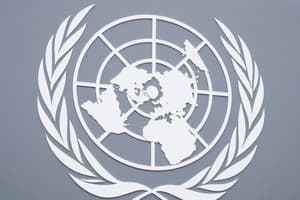Podcast
Questions and Answers
What are the roles of the United Nations?
What are the roles of the United Nations?
- To maintain peace and security (correct)
- To prevent World War Three (correct)
- To expand military influence
- To solve collective problems like climate change (correct)
What does the UN Charter Preamble reflect?
What does the UN Charter Preamble reflect?
Idealism of the organization and natural law
What does UN Charter Chapter I primarily outline?
What does UN Charter Chapter I primarily outline?
Purposes and principles of the UN
What can happen to members who violate the principles of the UN Charter?
What can happen to members who violate the principles of the UN Charter?
What is the role of the General Assembly according to Chapter IV?
What is the role of the General Assembly according to Chapter IV?
What primary responsibility does Article 24 assign to the Security Council?
What primary responsibility does Article 24 assign to the Security Council?
The resolutions passed by the General Assembly are binding.
The resolutions passed by the General Assembly are binding.
The Security Council passes resolutions that are binding.
The Security Council passes resolutions that are binding.
What does Article 39 allow the Security Council to determine?
What does Article 39 allow the Security Council to determine?
What can the Security Council order according to Article 42?
What can the Security Council order according to Article 42?
What does Article 43 require from UN members?
What does Article 43 require from UN members?
What is the primary function of the International Court of Justice?
What is the primary function of the International Court of Justice?
What type of sanctions does Article 41 discuss?
What type of sanctions does Article 41 discuss?
Flashcards are hidden until you start studying
Study Notes
United Nations Overview
- Established to prevent major conflicts and to promote global peace and security.
- Addresses collective issues such as climate change and humanitarian crises.
UN Charter Preamble
- Reflects the organization's idealism and a higher moral code.
- Supersedes national laws in certain circumstances, as noted during Nuremberg Trials.
UN Charter Chapter I (Purposes and Principles)
- Outlines the fundamental purposes and principles of the UN.
- Emphasizes sovereign equality of all member states (Article 2,1).
- Prohibits the use of force (Article 2,4) with an exception for self-defense in armed attacks (Article 51).
- Limits UN intervention in domestic affairs unless extreme circumstances arise (Article 2,7).
UN Charter Chapter II (Membership)
- Allows the expulsion of members who violate Charter principles.
- Expulsion requires a recommendation from the Security Council to the General Assembly (Article 6).
UN Charter Chapter IV (The General Assembly)
- Article 10 allows the General Assembly to make recommendations to the Security Council.
- Article 11 provides authority to discuss general principles and make recommendations.
- Article 12 addresses the General Assembly's functions related to the Security Council.
UN Charter Chapter V (The Security Council)
- Article 24 designates the Security Council with primary responsibility for maintaining peace and security.
- Article 25 mandates UN members to comply with Security Council decisions.
General Assembly
- Passes recommendations through resolutions that are not binding on member states.
Security Council
- Issues binding resolutions that must be upheld by member states.
International Court of Justice (ICJ)
- Acts as the principal judicial body of the UN.
- Resolutions from the ICJ are difficult to enforce across member states.
Chapter VII (Action Regarding Threats to Peace)
- Article 39 empowers the Security Council to identify threats or acts of aggression.
- Article 41 allows for non-military sanctions, such as economic and trade restrictions.
- Article 42 enables the Security Council to order military action under extreme circumstances for peacekeeping.
- Article 43 obligates UN members to provide military support when requested.
Chapter XIV (International Court of Justice)
- Article 92 identifies the ICJ as the main judicial entity of the UN.
- Article 93 requires compliance with ICJ decisions from member states involved in cases.
- Article 96 allows the ICJ to provide legal advice to the Security Council and General Assembly upon request.
Studying That Suits You
Use AI to generate personalized quizzes and flashcards to suit your learning preferences.



